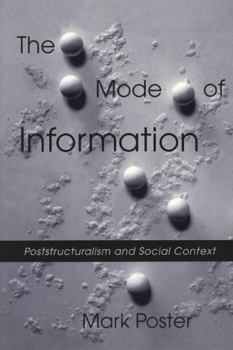The Mode of Information: Poststructuralism and Social Context
Select Format
Select Condition 
Book Overview
When we make phone calls and use computers, electronic devices mediate how we communicate. In each instance, we exchange symbols and information just as we have since humans began speaking and writing. What, then--besides economy of space and time--differentiates electronic communications from ordinary speech and writing? The difference, Mark Poster argues, is the profound effect electronic mediation exerts on the very way we perceive ourselves...
Format:Paperback
Language:English
ISBN:0226675963
ISBN13:9780226675961
Release Date:August 1990
Publisher:University of Chicago Press
Length:188 Pages
Weight:0.64 lbs.
Dimensions:1.1" x 6.0" x 9.0"
Customer Reviews
1 rating
Humans Inside Machines
Published by Thriftbooks.com User , 15 years ago
Everyone who wants to understand how subjectivity, the "in here" of each of us, is shaped in the late modern age must read two chapters of this book. What McLuhan did for media, Poster does for information; he explains how databases and computer science set us up and bring us forth in their own distinctive ways. Saying he "explains" is perhaps too strong; the shaping of our "in here" is an elusive matter. But if you're looking to understand critics who complain that our everyday life is "informatized" and that the self is "multiplied by databases," these chapters are superior to anything I've read eleswhere, especially given their brevity. The remainder --an introduction to post-industrial society and chapters on TV commercials and electronic writing--are excellent and will be useful to many. Poster's perspective is commonly known as "post-modern," and he enlists four seminal thinkers to do the heavy lifting: Jean Baudrillard (TV commercials), Michel Foucault (databases), Jacques Derrida (electronic writing) and Francois Lyotard (computer science). Readers who are not familiar with this perspective or these authors may find themselves befuddled. Poster doesn't do much handholding; the book is a terse 150+ pages. To remedy this situation, readers may want to bone up with Robert Hollinger Postmodernism and the Social Sciences: A Thematic Approach (Contemporary Social Theory) and/or Pauline Marie Rosenau, Post-Modernism and the Social Sciences. Once you're up to speed, anyone thinking hard about how the self, the hero of modernism, emerges within post-modern or more modestly late modern conditions will find Poster's slender volume an important contribution.





